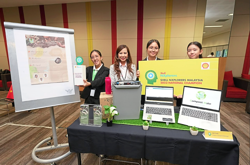In our journey to escape the middle income trap and move towards high income status, it is critical to pursue a just transition approach in education.
IT was heartening to see the federal education system getting the largest share of Budget 2024 recently.
The road to achieving equity in education is a long one, considering the state of learning loss in Malaysia, one of the highest among Asian developing nations according to the Asian Development Bank as of April 2021.
At the height of the pandemic, 21,316 students dropped out of school between March 2020 and July 2021.This points to larger systemic issues which are still rampant, primarily poverty in underserved communities, that impact access to education.
Equal opportunities for learning, which align with the Malaysia Education Blueprint 2013 to 2025 goals and the Sustainable Development Goals (SDG), are part of the country’s sustainability equation.
In our journey to escape the middle income trap and move towards high income status, it is critical to pursue a just transition approach in education.
We need to ensure that no one is left behind, and that everyone should be able to live, learn, work and participate in the digital world.
A multi-stakeholder approach is necessary to address education inequity, where system leaders like education officers, and educators are empowered to transform education, alongside private sector intervention.
Enhancing the learning experience of students
Providing the right digital resources to aid learning has become a key expectation in the post-pandemic environment.
There are indicators that the learning experience in schools have improved, such as the 5.8% improvement recorded on the learning experience of students in the Student Voice Matters 2023 report.In addition, government initiatives catering to groups needing the most attention are welcomed, notably the allocation earmarked in Budget 2024 for the construction of special education blocks in selected schools, and disabled-friendly facilities to support students and teachers.
While it’s important to engage students, pushing for systemic change in the education system is only possible by reaching those with the ability to make a direct impact on our future leaders; teachers.
Critically, our education system needs teachers that are adequately trained to engage students and enable them to participate in the digital world.
The role of the teacher needs to evolve beyond transactional to transformational teaching, where they are involved in mentoring students to reach their full potential.
At PwC, beyond organising initiatives to engage students, we have evolved to reach out to educators and system leaders.
Under our “New World. New Skills” digital upskilling programme, we are currently sponsoring the Applied Leadership Programme to help transform student learning outcomes by empowering education officers who can reform the system. As of 2022, a number of Education Ministry officers under the programme are working towards achieving certification by Google for Education as well as the Human Resource Development Corp.
Well-being matters
We would be remiss to discuss education inequity without shining a light on the well-being of students.
Studies have shown that certain issues can be more acute among students with financial concerns who worry over their socio-economic circumstances.
It is worth considering if government support for mental health is cascading to schools adequately and whether the effectiveness of on-the-ground interventions for students with discipline issues are consistently monitored. Investing in regular training, upskilling and experience sharing initiatives with counsellors is critical, as well as giving them the necessary support in handling unique mental health cases among students.
A boost from the private sector
Beyond enhancing the quality of learning, we also need to ensure that students are future fit.
Closer collaboration between the public and private sector is the way forward to ensure that initiatives in school are holistic and mapped to industry standards and needs.
The school curriculum, for instance, will benefit from greater private sector involvement in shaping the Science, Technology, Engineering and Mathematics (Stem) syllabus. We hear of commitments made at the Technical and Vocational Education and Training (TVET) level, with a number of government-linked companies and private companies setting out to cooperate with public TVET institutions through curriculum development.
There is value in starting these interventions earlier, during the formative years in education.
Introducing artificial intelligence (AI) to students while in school can be a springboard to assess their talents and aptitude for Stem careers.
There were also talks about introducing robotics in primary school, which can contribute to building a pool of talents with the right skill sets for this emerging field in industries like manufacturing, agriculture and healthcare.
Companies can also look into sponsoring competitions at the school level to challenge the digital acumen of students and provide them exposure to robotics and automotive engineering.In conclusion, while there are pockets of progress in improving the state of education in Malaysia, change needs to be accelerated with greater urgency and integration, through the support of multiple parties.
This needs to be aligned with the SDG, by plugging fundamental issues around poverty and uneven access to education.
It will be interesting to see how the recent budget proposals can provide the necessary uplift to enhance current education commitments around quality, access and relevance as part of Madani Economy aspirations.
Nurul A’in Abdul Latif is executive chair of PwC Malaysia. The views expressed here are the writer’s own.





